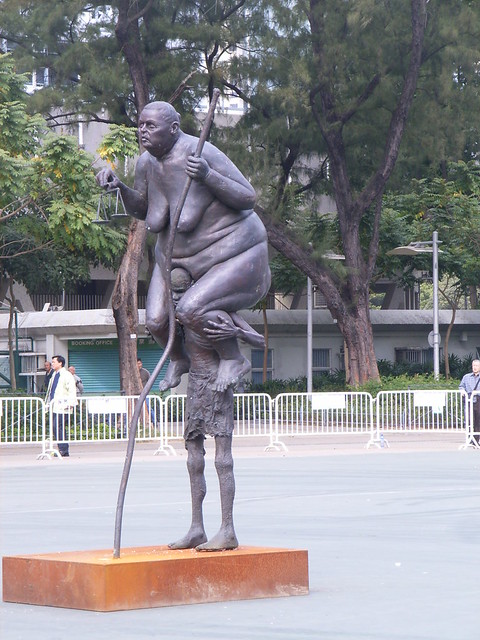
📌 Learn about Africa’s powerful civilizations before Europeans.
Survival of the Fattest is a sculpture of a small starving African man, carrying Lady Justice, a huge obese European woman who is a symbol of the rich world.
The copper statue Survival of the Fattest by Jens Galschiøt and Lars Calmar was created in 2002. The fat woman is holding a pair of scales as a symbol of justice however; she is closing her eyes so the justice. Galschiot symbolized the woman as being blind, refusing to see the obvious injustice.
For the rich people of the world the main issue in life is that of overeating while people in the third world are dying every day from hunger. The misery of imbalanced wealth distribution is creating floods of refugees. However the rich only want to preserve their privileges and take measures so harsh against the poor they betray their morals and humanism.
Survival of the Fattest has been displayed throughout Germany, and Paris France as a visual symbol of imbalanced wealth distribution. Art In Defense of Humanism, AIDOH states "Due to the imbalanced distribution of the resources in the world, the most people in the western countries are living comfortably; they are oppressing the poor people by means of an unjust world trade."
Survival of the Fattest statue four facts.
In 2009 at the 15th Climate Change Conference, Jens Galschiot exhibited a series of sculptures titled Seven Meters, in which Survival of the Fattest was the most popular sculpture.
On the sculpture there is an inscription, which states: "I'm sitting on the back of a man. He is sinking under the burden. I would do anything to help him. Except stepping down from his back."
The 11 feet, 3.5 meters tall Survival of the Fattest sculpture was created by Jens Galschiøt in collaboration with his colleague Lars Calmar.
Survival of the Fattest sculpture was unveiled in December 2002 in Copenhagen Denmark.
📚 This story is part of the Explore Africa Collection .









